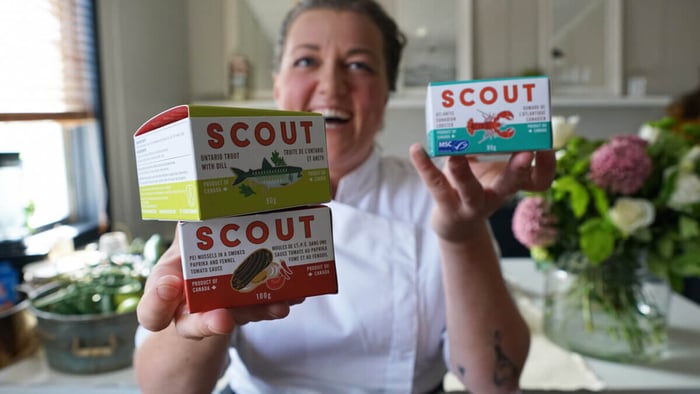A new & traditional take
While food waste firmly ranks as the single largest category of material placed in municipal landfills, plastics aren’t all that far behind. It’s estimated that 91 percent of plastic goes unrecycled, making its way into oceans and landfills around the world, none of which comes as a surprise when recognizing that not all plastics are recyclable.

Scout’s commitment to addressing these co-morbid problems is displayed with every product produced—responsibly sourced seafood, regenerative packaging materials, and never any plastics. Our solution isn’t revolutionary, however—in fact, it’s quite traditional.
Canning is a practice, with its heritage rooted in preserving and canning in-season seafood harvests at their best to retain maximum nutrition and flavour for consumers to enjoy year-round. But the component that makes this food-waste-mitigating cuisine so regenerative is that each can possess’ the potential to be used again.
Aluminum is 100 percent recyclable. The sustainable properties of this storage method are highlighted when recognizing that aluminum cans are composed of 70 percent recycled materials—significant when compared to the runner-up, glass jars, which are composed of 23 percent recycled content.

In the early 1990s, developing concerns related to the use of BPA in canned products created a shift in how canning was perceived. Bisphenol A, or BPA, is a chemical that is used to make epoxy resins that serve as the extremely thin lining found inside an aluminum can, or the lid of glass jars. This lining’s purpose is to prevent food from losing flavor or spoiling and to prevent the tin from getting worn out or rusted.

While BPA linings might not be as threatening as once believed, many producers have shifted towards non-BPA alternatives. Scout works with the French manufacturer, Trivium Packing, to produce BPA-free cans with linings made from vegetable-based glycerin, ensuring that consumers’ safety is prioritized.
Each can of Scout tells a tale of responsibility. Starting from the fully recyclable FTC-certified box made of water-soluble non-toxic vegetable ink, to the 100 percent recyclable BPA-free aluminum can, and of course, the seafood. Scout is committed to ensuring that each seafood species in its lineup, including Atlantic Canadian Lobster, Wild Albacore Tuna, Organic PEI Mussels, and Ontario Trout, is made the most of, with an understanding that there are enough resources on this planet for everyone if utilized effectively.



